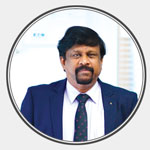India’s manufacturing sector is undergoing a transformation, driven by innovative practices, supportive policies, and a focus on sustainability. These efforts are positioning India as a competitive player in the global manufacturing landscape, poised for substantial growth and development in the coming years. The spirit of innovation is all-pervading and every player in the Indian industry seems to subscribe to the axiom that there is a better way to do things, and change is the only thing which is constant. Engineering Review spoke to some of the leaders in the industry to get a feel of their spirit of innovation. We are happy to quote their insightful reflections and revelations in this landmark issue. – Editor
“We enable businesses to optimize their energy usage, minimize environmental impact, and contribute to a more sustainable future.” – Syed Sajjad Ali, Managing Director-Es India, Eaton Power Quality Pvt. Ltd.
Eaton has identified mega trends and gives priority for energy transition, energy consumption and digitalization. Our strategy is centered around the concept of ‘Everything as a Grid,’ which empowers to store, distribute, and utilize power intelligently.
On the digital front this is facilitated by our Brightlayer suites, especially Brightlayer Industrial, which supports over 13 different industry protocols. Such interoperability ensures smooth integration with existing systems and boosting efficiency.
Eaton has an illustrious history of R&D and Manufacturing innovations helping launch innovative products. Our XIRIA+ Solid Insulated Switchgear, HMH36 medium voltage switchgear, 93PR range of UPSs, and BussMann fuse range are some examples of this journey. XIRIA+ with its maintenance-free and SF6-free design, embodies our commitment to operational safety and environmental sustainability. Our Low Voltage switchgear solutions address challenges like high temperatures with features like no de-rating up to 55 degrees celsius. Eaton is constantly developing high efficiency UPS and will be soon launching 1500kW UPS range that serves Datacenter customers requirement of lower TCO and higher power density. Eaton is at the forefront of promoting sustainable technologies and the shift towards clean energy. We are actively offering Battery Energy Storage Systems (BESS) for storing surplus energy for future use. Eaton supports the increasing adoption of electric vehicles through our Electric Vehicle Charging Infrastructure (EVCI).
These innovative products are manufactured at our Pondicherry Plant which is at the forefront of technology deployment with Industry 4.0 practices implemented to enhance process capability and optimize production efficiency. We embrace automation and digitalization of processes to ensure high-quality products for our valued customers. Pondicherry plant is a Zero Waste-Water Discharge plant. This is one of the 12 Model Plants globally in Eaton Electrical Sector, a recognition received after rigorous assessment of key Operational metrics like Safety, Quality, Delivery, etc. With such innovative solutions backed by robust manufacturing processes, Eaton enables businesses to optimize their energy usage, minimize environmental impact, and contribute to a more sustainable future.
“We provide top-tier, reliable, and sustainable solutions to our clients worldwide” – Neelesh Dixit,K Managing Director, Renmakch India Pvt. Ltd.
RENMAKCH, with decades of experience in engineering and manufacturing, has consistently been at the forefront in supporting various industry segments with innovative solutions. Our relentless pursuit of excellence and technological advancements has led us to develop state-of-the-art solutions that significantly enhance the efficiency and reliability of the customised solutions we offer.
One of our core strengths lies in the innovative fabrication of steel structures. Our advanced techniques include precision welding, automated cutting and systematic assembly, which ensure high-quality and durable products that meet stringent industry standards. By integrating computer-aided designing with simulation and skilled manufacturing processes, we achieve unparalleled accuracy and reproducibility in our steel structures, enabling faster production and reduced wastage.
Moreover, RENMAKCH has revolutionized the testing procedures of manufactured equipment to guarantee optimal performance and safety. Our comprehensive testing solutions encompass non-destructive testing, static load testing, draw bar pull testing and condition monitoring using innovative technologies. These cutting-edge methods allow us to detect and address potential issues early on, ensuring that our equipment meets the highest safety and reliability standards before deployment on site.
Our commitment to innovation is further exemplified by our adoption of green manufacturing practices. By utilizing energy-efficient processes and sustainable materials, we minimize our environmental impact while maintaining the highest quality of our products. This approach not only supports global sustainability efforts but also resonates with modern manufacturing processes, increasing focus on eco-friendly operations.
In summary, RENMAKCH’s innovative solutions for manufacturing, fabrication of steel structures and parts, followed by rigorous testing protocols, set us apart as a distinguished manufacturer of customised machinery, equipment and parts. Our experience and dedication to technological advancements ensure that we continue to provide top-tier, reliable, and sustainable solutions to our clients worldwide.
“We strive to be at the forefront of our industry and continuously push the envelope when it comes to new technologies and practices.” – Indraneel Bhattacharya, Vice President – Sales & Marketing – Machine Tool Div., Lakshmi Machine Works Ltd.
We at LMW make India’s finest range of CNC machines. We have our modern manufacturing facilities equipped with state-of-the-art mother machines and advanced quality checking equipment to provide uncompromising quality products to the end-user industry. The processes established are foolproof to ensure that every machine delivered, performs to the same levels it is designed for, and the build process also ensures longevity of the machine, meeting global standards. Our products are capable of manufacturing various components that require complex machining. Fifty percent of our business is from auto industry and naturally we are specialized in manufacturing auto components. If one such area can be singled out, we would say we have some great solutions for transmission parts like steering, gearbox, differential, etc. Our machines are also a top choice for precision machining to meet high quality requirements of industries such as aerospace, medical, die & mould and so on.
Our mother machines have the capability to collect and analyze data in real time. Our machines are equipped with predictive analytics which helps to maintain regularly, minimize the machine downtime and enhance the product quality.
Coming to R &D, the development of our products is based on emerging manufacturing trends and technologies, as well as market demands. As a market leader, we focus on delivering the latest and value-driven products which are very compact, cost-effective and of high speed to address the needs of small component manufacturers whose volumes are very high. The bearing industry is an example.
LMW is driven by our customer-centric approach which is underpinned by attributes like value creation, integrity and innovation. We strive to be at the forefront of our industry and continuously push the envelope when it comes to new technologies and practices. Exceeding customer expectations is our foremost objective, and we are dedicated to ensuring customer delight day in and day out. We have demonstrated great performance in various aspects of market demands such as accuracy, long lasting repeatability, reliability, reduction in cycle time, low cost per component, high productivity and unmatched customer service.”
How can manufacturers adapt to industry challenges in 2024?- Helen Blomqvist, President Of Metal Cutting Tools And Manufacturing Solutions Expert , Sandvik Coromant
From digitalisation and demand forecasting to economic uncertainty & emissions targets, 2023 presented several challenges for the manufacturing industry. However, these difficulties also provide opportunities for manufacturers to innovate and increase their competitiveness as the industry transforms.
Strengthened sustainability focus
The focus on reducing our environmental impact intensified in 2023, with IBM’s Institute for Business Value data showing86 per cent of companies now have a sustainability strategy in place. While this figure is promising, data shows that only around a third of businesses have acted on their strategy since its implementation.
2024 will hopefully see the rise of businesses treating sustainability as a priority. This is especially important within the manufacturing industry, which is responsible for one-fifth of global carbon emissions according to World Economic Forum data. Currently, the sector is not sustainable enough, and we can do a lot more. Ensuring that sustainability is not just a strategic ambition but a tangible, integrated part of daily operations is key to reducing emissions and achieving green targets. By combining strategic alignment, employee engagement and continuous data-driven improvements, manufacturers can not only achieve environmental and social goals but also drive innovation, reduce costs and enhance the company’s reputation and competitiveness.
This multifaceted approach is outlined by Sandvik Coromant’s new brand promise of Manufacturing Wellness, which aims to drive sustainable progress through impactful partnerships. Manufacturing Wellness is a relentless pursuit for improvement, made up ofeight habits found in successful and resilient manufacturing companies. Sustainability and eliminating waste are the third and fourth habits of this mindset, which allows us to drive sustainable progress towards a better tomorrow for people, industry and society at large.
This commitment is underscored by the recent validation of our net zero target by the Science Based Targets initiative (SBTi).As demand for sustainable products continues to grow, such certifications will become increasingly important for manufacturers looking to stay competitive in a transitioning market.
Developing digital capabilities to meet demand
2023 saw manufacturers feel the aftershocks of several supply chain issues. This particularly impacted the aerospace manufacturing sector, which was still in recovery mode post-pandemic.
However, with demand bouncing back, there has been a revived need from airlines looking to expand or renew their fleets to accommodate the resurgence in passenger travel and to meet new environmental standards with more fuel-efficient aircraft. The industry’s growth in 2024 will likely depend on how well manufacturers and the broader ecosystem can adapt to these evolving challenges and opportunities.
Aerospace manufacturers can increase their productivity by focusing on resilience, innovation, agility and sustainability. A key way to achieve this, especially for those involved in metal cutting processes, is to integrate digital manufacturing tools for enhanced operational efficiency. A 2021 study of manufacturing companies conducted on behalf of Sandvik shows over two thirds of manufacturers now implement these tools. Use cases include areas such as digital twins, computer numerical control (CNC) integration, process monitoring systems and cloud computing.
Digital tools support data-driven manufacturing, the fifth of Sandvik Coromant’s Manufacturing Wellness habits, which helps businesses spot potential improvements and accelerate productivity from CAD to delivery. Processes that are informed by data can help improve equipment uptime and extend working life by enabling manufacturers to identify potential failures before they occur. As 2024 progresses, we are likely to see the increased adoption of artificial intelligence (AI) tools to analyse data, with this level of automation helping to meet renewed demand while reducing costs. Incorporating AI tools is a core part of the Manufacturing Wellness mindset, outlined in the second habit of embracing new technology and the eighth habit of automation.
Planning for flexible production
As well as allowing businesses to meet resurgent demand, digital manufacturing tools also facilitate the resource planning process for industries where demand is difficult to predict. This is particularly useful for automakers, who arefacing increasing pressure to prepare for the upcoming fossil fuel car phase out. It is important that manufacturers have sufficient EV capacity in time for the 2035 fossil fuel car ban in UK and the EU, which has made resource planning difficult.
Data-enabled manufacturing allows for more flexible production systems that can quickly adapt to changes in product design or customer demand, facilitating the production of customised or small-batch items without significant efficiency loss. Integrating digital tools with supply chain management systems can improve forecasting, reduce inventory levels and enhance coordination with suppliers and customers, leading to a more responsive and efficient supply chain.
As the year progresses, the importance of industry trends such as sustainability, digitalisation and demand forecasting will continue to grow. However, viewing these challenges as opportunities to innovate will help to develop successful, resilient manufacturers that thrive in 2024 and beyond.





 “We strive to be at the forefront of our industry and continuously push the envelope when it comes to new technologies and practices.” – Indraneel Bhattacharya, Vice President – Sales & Marketing – Machine Tool Div., Lakshmi Machine Works Ltd.
“We strive to be at the forefront of our industry and continuously push the envelope when it comes to new technologies and practices.” – Indraneel Bhattacharya, Vice President – Sales & Marketing – Machine Tool Div., Lakshmi Machine Works Ltd.
